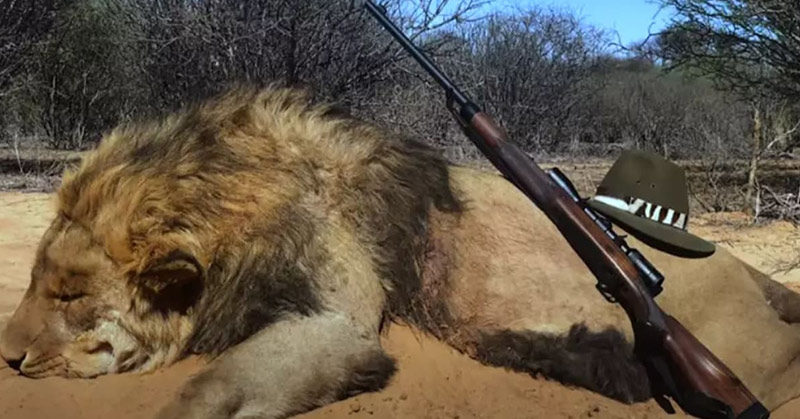The recent and widely popular Netflix special, Tiger King, thrust the US big cat industry into the spotlight, showcasing the poor treatment and unhealthy environment in which these animals are kept. Unfortunately, the use of captive animals for tourism and entertainment is not a new, or uniquely American, problem. Lion farming is a massive and barbaric industry in South Africa.
There are an estimated twelve thousand captive-bred lions in the country, which is four times the wild population. One man has made it his mission to expose this industry and put a stop to animal cruelty [1].
Lion Farming in South Africa
Lord Michael Ashcroft is a businessman and philanthropist from the UK. His recently published book and accompanying film, Unfair Game: An Exposé Of South Africa’s Captive-Bred Lion Industry, gives an in-depth look at the lion farming industry in South Africa and sheds light on a cruel practice known as “canned hunts” [2].
He describes the industry as conscious, intentional cruelty, sometimes carried out with or for pleasure, and is demanding that action be taken to stop it.
Canned hunting is a practice whereby lions are bred in captivity, then drugged and released into a small area so that a tourist (who has paid thousands of dollars) can shoot the animal. Once these farm-bred lions have served their purpose, their bones and other body parts are often exported for use in the Asian medicine market.
The animals are used and abused for financial gain from the time they are cubs, being forced to play with tourists all day long when they should be sleeping for 16 to twenty hours per day in order to properly grow and develop.
Some of the footage that can be seen in the film includes a drugged lion being attacked by a pack of dogs, a sedated lion being shot in the back of a truck, and a lioness being shot while up in a tree.
Operation Simba
In his book, Ashcroft describes how he and an undercover team managed to save one of the lions that was about to be shot in a canned hunt. The mission was titled Operation Simba, named for the lion they saved.
To carry out the mission, Ashcroft hired undercover operatives which included former members of the UK’s special forces. The team base themselves in South Africa for several months to collect information and evidence to build their case.
Ashcroft points out how dangerous the mission was, since the industry has close ties with global organized crime. They managed to recruit a South African Lion dealer as an undercover agent so they could infiltrate the business. The agent, who they gave the codename Lister, was able to provide much of the video footage depicting the cruel treatment given to the lions [2].
After months of expert undercover work, the team managed to save Simba, but Ashcroft is aware that much more needs to be done.
“Despite my feelings of euphoria at having saved Simba in the nick of time, it seemed clear that more needed to be done,” said Ashcroft. “It was obvious that those who profit by abusing lions are able to operate with great ease in South Africa.” [2]
Read: German Lab Called Out for Abhorrent Animal Cruelty
Big Cats are Worth Big Money
Not only are captive lions valuable as a tourist attraction, but their remains can be sold for large sums of money in countries like China where they are used to make pills and potions for unsubstantiated ‘medicines’.
According to Ashcroft, an adult tiger skeleton can be worth up to twenty thousand dollars, while an adult lion skeleton can only bring in up to four thousand dollars. Because of this price difference, lion bones are often falsely passed off as being tiger bones [3].
This bone trade is not only a problem for the lions, but can pose health risks for humans as well, since lions can carry zoonotic diseases similar to the novel coronavirus.
“Experts have told me of their belief that a major public health incident will occur in South Africa and Asia as a result of the lion bone trade,” he says [3].
The COVID-19 Threat to Captive Lions
Many of the nearly three hundred breeding centers in South Africa rely on tourism as their main source of income- an industry that has all but vanished during the COVID-19 pandemic. Because of this, these centers will now either euthanize their animals or allow them to starve to death [4].
“Without tourism revenue, and an already appalling welfare record, thousands of captive lions are going to be left to starve,” said Michele Pickover, director of advocacy group the EMS foundation. “This is a catastrophe that could have been avoided.” [4]
Many wildlife conservation groups are hoping that the novel coronavirus pandemic will spell the end of the lion trade, given the fear over viruses that can be transmitted from wild animals.
An alliance of groups called the Lion Coalition wrote a letter to the World Health Organization (WHO) to request that they advise all governments to shut down wildlife markets:
“Bovine tuberculosis has been documented among wild and captive-bred lions, posing a substantial risk of zoonosis to consumers and people involved in the lion bone trade, particularly those who work in breeding farms, slaughter and processing facilities in South Africa,” said the letter [4].
The government has suspended the annual quotas for captive lion breeders in the international bone trade while a high level panel conducts a policy review, and their recommendations to determine the long-term future of the industry are expected at the end of 2020 [4].
Keep Reading: Lion Cub’s Legs Deliberately Broken So He Couldn’t Escape While Tourists Posed For Photos
- https://www.theanimalclub.net/wildlife/12000-lions-being-farmed-in-captivity-to-be-shot-dead-by-tourists-in-canned-hunts/
- https://www.dailymail.co.uk/news/article-8418381/How-LORD-ASHCROFT-exposed-barbaric-industry-earth-South-Africas-captive-lion-trade.html
- https://news.mongabay.com/2020/04/coronavirus-is-a-crisis-for-south-africas-captive-lions-campaigners-warn/

